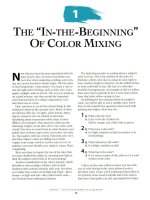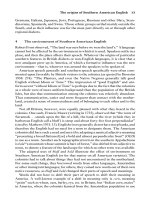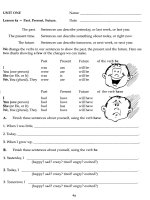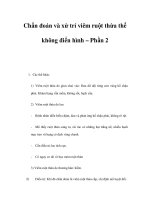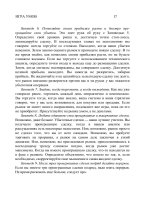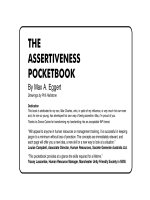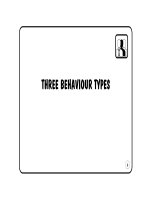THE ASSERTIVENESS POCKET BOOK phần 2 doc
Bạn đang xem bản rút gọn của tài liệu. Xem và tải ngay bản đầy đủ của tài liệu tại đây (92.04 KB, 10 trang )
THREE BEHAVIOUR TYPES
9
THREE BEHAVIOUR TYPES
THE THREE OPTIONS
When faced with difficult situations animals have two options:
FLIGHT = non-assertion
FIGHT = aggression.
Humankind has a third option: ASSERTIVENESS, which is essentially a considered
response to difficult situations.
Let us look at these three options:
● Non-assertion
● Aggression
● Assertiveness
so that we can recognise them in ourselves and be able to manage them constructively.
10
THREE BEHAVIOUR TYPES
1. NON-ASSERTIVE BEHAVIOUR
The non-assertive person:
● Is reluctant to express own opinions, and particularly, feelings
● Often feels used by others
● Keeps quiet when others take advantage
● Refrains from complaining when services or products
are not up to standard
● Finds it difficult to refuse the requests of others for
time or resources
● Acquiesces in the views and desires of the majority
even though these conflict with personal wishes
● Frequently makes compromises in the interests
of harmony
● Is unwilling to inconvenience people for the things
he or she wants
● Is submissive in the presence of aggressive behaviour
● Prefers to keep own views private
11
THREE BEHAVIOUR TYPES
1. NON-ASSERTIVE BEHAVIOUR
OUR REASONS
Fear of upsetting others
There is a myth in interpersonal relations that goes like this. If you sacrifice enough, work
hard enough, care enough, forgive enough, other people will give you their approval.
It gets worse. If you don’t gain their approval it is because you are not giving up enough,
working hard enough, caring enough, etc.
● You can choose to change your behaviour if you think that the cost of losing
someone’s friendship is higher than doing or saying what you want; but it is indeed
rare for anything to be that significant
● What you are is something absolute, and independent of the goodwill of others;
what others think of you does not make you any more or any less of what you are
● People usually want you to change your behaviour when they don’t get exactly what
they want; even if they think ill of you, what you know yourself to be does not change
12
THREE BEHAVIOUR TYPES
1. NON-ASSERTIVE BEHAVIOUR
OUR REASONS
Fear of rejection
This is the extreme version of fear of upsetting others. If we upset someone by asking
for what we want, we fear they will withdraw their regard for us and reject us altogether.
● In any relationship there has to be give and take, but if it is all ‘take’, then the
relationship is essentially flawed at a basic level, and the price is too high for any
individual to pay
● Usually, a moment’s reflection is enough to make you realise that:
a) if they say no, they are unlikely to reject you personally, and
b) if they do want to reject you then the price of their friendship is too
high anyway
13
THREE BEHAVIOUR TYPES
1. NON-ASSERTIVE BEHAVIOUR
OUR REASONS
Feeling responsible for the other person
There is a real difference between hurting someone and someone feeling hurt. You are
not responsible for their feelings; if they ‘feel’ hurt because of a reasonable need that
you have, then that is their choice.
This is totally different from a situation where, through aggressive behaviour, you hurt
someone by abusing their rights, taking deliberate advantage or by not respecting them
as a person.
Inappropriate inner voices
This occurs when the rules by which we live have been determined by others, usually
during childhood, and we still operate by them. (See page 22 for further thoughts on this.)
14
THREE BEHAVIOUR TYPES
1. NON-ASSERTIVE BEHAVIOUR
SELF-DEFEATING MIND GAMES
Someone once said that there are two realities - the way we think things are, and the way they
really are. The way we think about ourselves and our experience can very much affect us and
our behaviour. If our perceptions are our reality we must be very careful not to play self-
defeating mind games. We must be aware of what psychologists call ‘cognitive distortions’,
that is the way the mind lays an inappropriate explanation over a neutral experience.
NEUTRAL FACTS + EMOTIONAL INTERPRETATION = DISTORTED REALITY
Here are the more common games
we play to defeat ourselves:
G GENERALISATION
D DOOMSDAYING
L LABELLING
MR MIND READING
F FILTERING
P PERSONALISING
We examine them in turn.
15
G
D
L
MR
F
P
THREE BEHAVIOUR TYPES
1. NON-ASSERTIVE BEHAVIOUR
SELF-DEFEATING MIND GAMES
Generalisation
This is taking one event and thinking it will always occur.
‘I failed once therefore I always fail’, or
‘I did not get it right first time so I will never get it right’.
This takes us back to ‘if you think you can or you
think you can’t, you’re right’. You get what you expect.
Your life becomes a self-fulfilling prophecy of failure.
Most upsets in life are ‘small stuff’.
Doomsdaying
This is magnifying something, typically blowing up a small
failure out of all proportion, as if it will bring about the
end of the world. The normal ups and downs of
everyday life become a series of huge tragedies and
dramas which compound feelings of personal failure.
16
G
D
THREE BEHAVIOUR TYPES
1. NON-ASSERTIVE BEHAVIOUR
SELF-DEFEATING MIND GAMES
Labelling
When you hang a large sign around your neck which says ‘hopeless’, or ‘lazy’ or
‘friendless’ then you are labelling yourself. When an opportunity occurs for you to do
something, you look down at your label and act accordingly. Like Daffy Duck, if you
have a label that says ‘No one loves me’ around your neck, and you keep saying it to
yourself, it quickly becomes reality.
Mind reading
You smile at a friend at a party and they ignore you; immediately you think they don’t
like you or you have upset them. This is because you can read minds, and just by
looking at them you can tell exactly what they think. The fact that they are short-sighted,
or thinking hard about something, or even a little intoxicated is neither here nor there.
People do things for a whole host of reasons and it is self-defeating to ‘mind read’ into
their behaviour a negative attitude towards yourself.
17
L
MR
THREE BEHAVIOUR TYPES
1. NON-ASSERTIVE BEHAVIOUR
SELF-DEFEATING MIND GAMES
Filtering
Filters do a great job of taking out unwanted material, but in the case of a personal filter
it removes all the positive things that occur in your life. Rather like the reverse of rose-
tinted glasses, people who filter only accept bad news about themselves and their
situations. Thus confirming their view of the world.
Personalising
When you personalise, you take full personal responsibility for a mishap or difficulty.
Events occur for a whole host of reasons, but you take full personal responsibility even if
your part was minor.
You can always do more, try harder, be more persistent, but you can’t control or be the
cause of everything. If you continually personalise the events in your life you will be
condemned to a life of everlasting doubt, guilt, blame and self-denigration.
18
F
P

